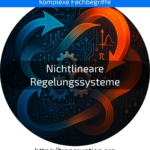Non-linear control systems are used primarily in the fields of automation, industry and Factory 4.0 as well as in robots. They are an important component of modern technologies and ensure that machines and processes function reliably even when conditions change suddenly or have complex behaviour.
In contrast to linear systems, which react according to fixed, simple rules, non-linear control systems can also respond to unpredictable or "disorganised" situations. They adapt their control flexibly instead of rigidly following a plan. This makes them particularly suitable for applications in which many different factors come into play at the same time.
An illustrative example is a self-propelled robot in a factory. While a simple robot always makes exactly the same turn, a robot with non-linear control recognises when an obstacle appears - even if this was not previously programmed - and reacts accordingly. This means that operation remains safe and efficient even in the event of faults.
Non-linear control systems are therefore key to enabling modern companies and robots to "think for themselves" and control processes safely and flexibly.






